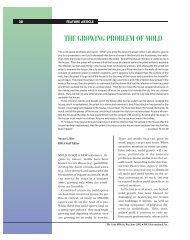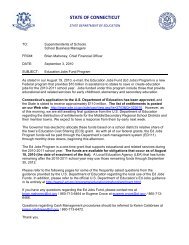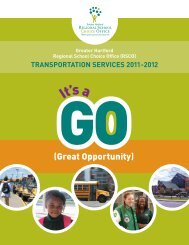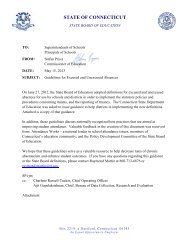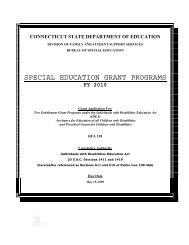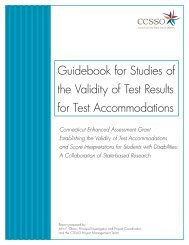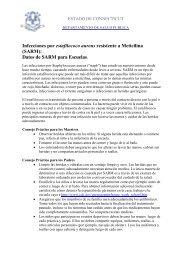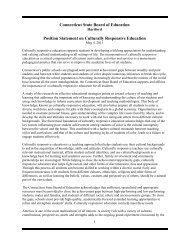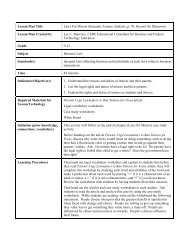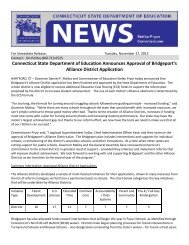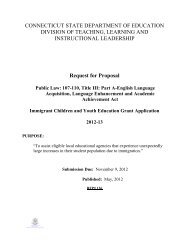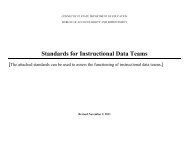Early Childhood - Connecticut State Department of Education
Early Childhood - Connecticut State Department of Education
Early Childhood - Connecticut State Department of Education
Create successful ePaper yourself
Turn your PDF publications into a flip-book with our unique Google optimized e-Paper software.
Social-Emotional Competence and Family Relations Chapter 10<br />
allergy to nuts can jointly think <strong>of</strong> ways to modify the<br />
program to ensure that the child is safe, and plan for an<br />
unanticipated emergency.<br />
<strong>Early</strong> childhood staff members who have<br />
concerns about a child’s developmental and functional<br />
progress should discuss their concerns with the child’s<br />
family. Initial strategies can focus on what needs to<br />
be done differently in the classroom that can support<br />
the child’s learning and success. This might mean an<br />
environmental change, a change to the curriculum<br />
and instruction, a change in child grouping or the<br />
implementation <strong>of</strong> a behavior plan for the program.<br />
Programs also may wish to pursue obtaining special<br />
outside expertise. This expertise could come from the<br />
program’s educational consultant or from an expert<br />
with special skills and knowledge.<br />
When program concerns have been identified<br />
and shared with families, and, despite modifications<br />
or adaptations in the classroom the child continues to<br />
appear to be challenged by the teaching and learning<br />
environment, it is time to look for more formal expertise.<br />
Help Me Grow, at Infoline United Way <strong>of</strong> <strong>Connecticut</strong>,<br />
is a statewide system available to parents and early<br />
childhood programs. Help Me Grow is designed to<br />
identify children who are at risk for developmental or<br />
behavioral problems and is able to connect children<br />
and their families to existing community resources.<br />
Examples include the <strong>Connecticut</strong> Birth to Three System,<br />
special education provided by school districts, a child<br />
development monitoring program, and referral to health<br />
and medical services. Families and early childhood<br />
programs can contact Help Me Grow by dialing 211.<br />
Communicating<br />
Effective communication skills and strategies serve as the<br />
basis for building all other relationships. When young<br />
children observe positive and genuine communication<br />
between their parents and teachers, they feel that their two<br />
worlds are connected. Formal communication is needed<br />
when everyone must receive the same information and<br />
when accuracy is required. Suggestions include a parent<br />
bulletin board, weekly messages, journals and a parent<br />
handbook. Informal communication with parents should<br />
happen every day. It occurs naturally when children are<br />
brought to the program and/or when they are picked<br />
up. Although most exchanges are casual, planning can<br />
help to maximize such opportunities. Jotting down<br />
something a child has done so it can be shared with<br />
140<br />
parents at the end <strong>of</strong> the day is one way to make these<br />
brief moments more meaningful and establish ongoing<br />
relationships.<br />
Parent Conferences<br />
While a great deal <strong>of</strong> valuable information can be shared<br />
in daily, informal communication, parent conferences<br />
provide time for more in-depth exchanges <strong>of</strong> ideas<br />
and for problem solving when needed. Conferences<br />
are excellent times for teachers to ask parents to share<br />
information that will help them meet individual<br />
needs. Conferences also provide good opportunities to<br />
help parents better understand a program’s goals and<br />
objectives, and how their child is progressing. Helpful<br />
guidelines for conducting parent conferences include<br />
the following:<br />
• Prepare parents in advance. Share the<br />
purpose <strong>of</strong> the meeting, its anticipated length<br />
and who will be present. Solicit parental<br />
input on topics for discussion.<br />
• Organize your thoughts and be prepared<br />
with examples and work to help parents<br />
understand your perspective.<br />
• Establish a relaxed and open tone for the<br />
meeting. It is important that all participants<br />
know that their contributions are valued.<br />
• Solicit parent perceptions, hopes and goals.<br />
Be sure to provide time to address their<br />
concerns and questions.<br />
• Be descriptive. Celebrate the child’s growth<br />
and avoid labeling or judging.<br />
• Share the curriculum and performance<br />
indicators with parents and provide examples<br />
<strong>of</strong> their child’s performance in the various<br />
domains.<br />
• Approach the conference as an opportunity<br />
to problem-solve with parents. Prepare, in<br />
advance, some possible strategies but remain<br />
open and willing to search together for<br />
answers.<br />
• Seek opportunities to agree on goals. Use<br />
the conference to work together on an action<br />
plan <strong>of</strong> steps for home and school in order to<br />
achieve these goals.<br />
• Set a time to talk again, even if by phone,<br />
and take responsibility for keeping parents<br />
informed.




